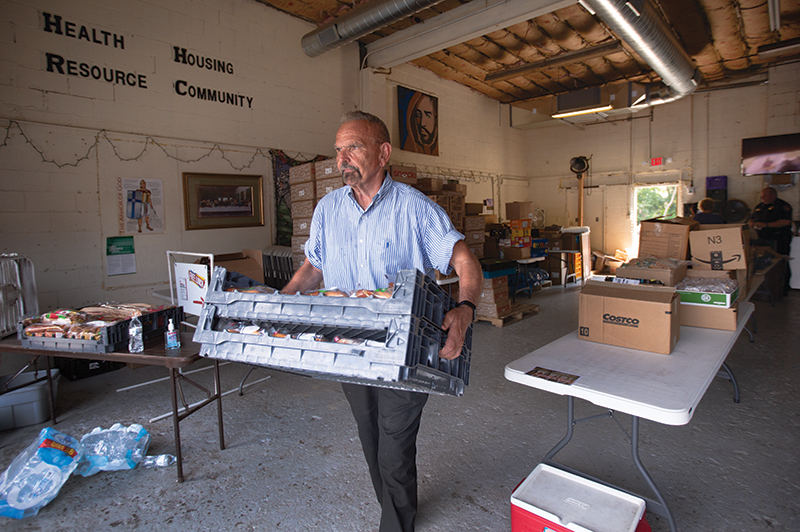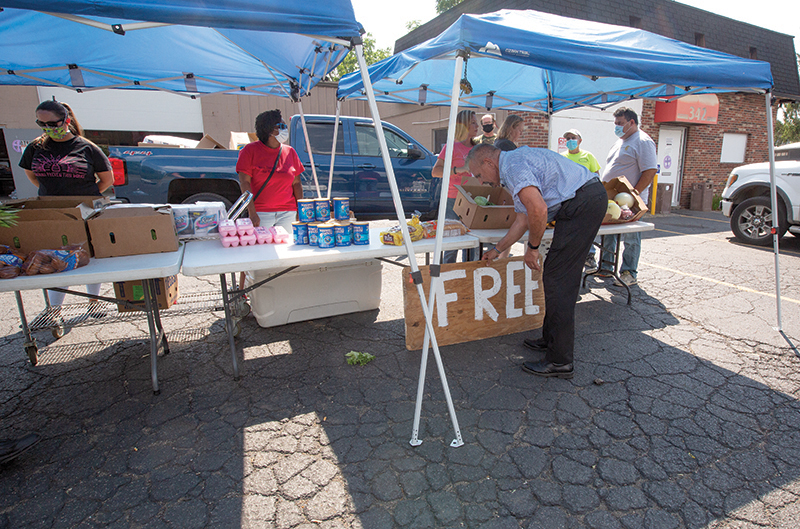Fred Rieser
Throughout his career, Fred Rieser’s work has been all about transformation. He wasn’t eager to join the family business, an auto body shop, when he left Eastern Kentucky University in the wake of a football injury—but he learned to relish erasing the damage inflicted by misfortune and returning battered vehicles to pristine condition. Rieser didn’t do the restoration himself, but he could see the potential behind each wreck when it came in—and he loved to see the looks on customers’ faces when they saw the finished product.
“I got to be the one to present the car to the customer,” he said. “I always wished I could bring the guys who did the work in and say, ‘Listen to what these folks are saying: This car looks better than it ever was.’”
Ten years ago, Rieser began work on a different kind of restoration project: himself. His son Jordan, 21, was killed when he lost control of the car he was driving and struck a tree. Trying to find a way to live with his grief, Rieser began ministering to the homeless and needy people he had long observed on the streets of the Hilltop neighborhood where the body shop was located. Helping, he said, was an escape.
“His way of grieving was, ‘I’m just going to start helping people,’” said Rieser’s daughter, Jennifer Rieser-Braunm, who nominated her father for an Everyday Hero award. “‘Nobody can help me with this pain that I have, so let me help people.’”
Fred Rieser sets up a weekly giveaway of food and supplies to homeless people on the West Side of Columbus. Tim Johnson | Dispatch Magazines
“A young kid invited me to help feed the homeless, so I did it one night, and I was into it hook, line and sinker,” Rieser recalled. He began making meals and distributing them from the back of his pickup in the parking lot of an abandoned Kmart store. When the store was redeveloped and he was asked to leave, he moved the growing mission to the back of the auto body shop.
Two years ago, the organization that grew from this effort, Jordan’s Crossing, moved into its own space on North Hague Avenue. At the same time, Rieser, who with his brother remains an owner of Fred Rieser Auto Body, quit his job and began spending all his time at Jordan’s Crossing. There, he and his wife, Donna, who owns a staffing company, along with a team of volunteers, minister to the needs of the West Side’s homeless population—providing meals, clothing, camping supplies, groceries, medical care, fellowship, advice and sometimes a dose of God.
Before the COVID-19 outbreak and Gov. Mike DeWine’s stay-home order, Jordan’s Crossing was serving up to 3,500 meals a month. Since March, Jordan’s Crossing has tripled its output, distributing 10,000 meals a month.
Situated next to the Camp Chase bike trail, where homeless people often set up camp, Jordan’s Crossing attracts a steady flow of people looking for help. The parking lot hosts a portable sanitation station (porta-potty and sink), installed by the city of Columbus, and depending on the day of the week, a free produce market, distribution of fentanyl test strips and naloxone, or COVID-19 testing. All of these services are provided by partnering agencies or nonprofits. Mount Carmel Medical Group’s Street Medicine team drops in each day to pick up bagged lunches for distribution at the homeless camps they visit. Ben Sears, a patient advocate who works with Mount Carmel, has been partnering with Jordan’s Crossing for six years. “Our service is best used when we have a strong partner in the community,” he said. “Jordan’s Crossing is adaptable, flexible. It’s a ministry, you know? They’re volunteers.”
Tim Johnson | Dispatch Magazines
The building, a onetime storage site donated by Custom Sign Center, is a work in progress. The front half, cleaned and renovated by volunteers, includes Rieser’s office, a prayer room, an open garage-type space where meals are assembled—right now, most distribution occurs outside—a stocked food pantry and a room filled with clothing and supplies. Upstairs is an apartment for a staffer who is on-call 24/7. The back is still rough, but Fred and Donna have plans to install showers, washers and dryers. A plan to create a coffee shop was interrupted by the pandemic. And if you walk out back, you’ll find a tiny, solar-powered house. It’s a prototype for the next stage of Fred’s dream: a village of tiny homes for men in recovery.
The staff is primarily volunteers, drawn from a network of more than 30 churches where congregants take turns cooking Friday night dinners, stocking the food pantry, making and delivering sandwiches and cookies, or donating clothing and supplies. They also support the organization financially.
Rieser-Braunm, who lives in Grove City with her husband, Tom, and three children, does the accounting. “We have a PayPal, and I’ll get on there and somebody will say I decided to give my tithe this week to Jordan’s Crossing … and it’ll be like a person tithed $11. I mean, that means so much to me.”
Ten years in, Fred and Donna Reiser still get choked up when talking about Jordan, whose smiling image covers a large banner overlooking the space where volunteers assemble meals. Donna makes sure to point out that drugs or alcohol were not to blame for the accident that took his life, something people often assume because of their work fighting addiction.
But both Donna and Fred spend more time talking about the energy they derive from seeing people improve their lives. For Fred, the best part of what he does at Jordan’s Crossing is the chance to guide someone out of addiction and toward a better life.
“I’ve been around some pretty successful people in my life, but the most impressive thing that I can tell you about is an individual that is three, four months into recovery. … They become something that is so inspirational to me. They’ve whipped something that you and I haven’t really done.
“This has created a new focus in us and in our lives so that we can go on living.”
During a visit to Jordan’s Crossing in July, a man named Darrell was helping out around the facility, unloading meat, lifting boxes. He’d been participating in mental health and addiction support programs in which Fred helped him enroll. “A month ago, we would have been afraid of him,” said Donna. “Why are people afraid of the homeless? They’re dirty, they’re not well groomed. You don’t know where they’re at—are they on drugs? But get rid of all that judgment, and you have this beautiful human being that has a story. He wants to work. He wants to give back.”
Fred watched Darrell walk away, headed for a medical appointment, and referred back to an earlier conversation about how he felt when returning a shiny, repaired vehicle to its owner. “I just wish that more people could see these people for what they truly are,” he said. “I just wish I could gather people up and say, ‘Let me present Darrell to you.’”

